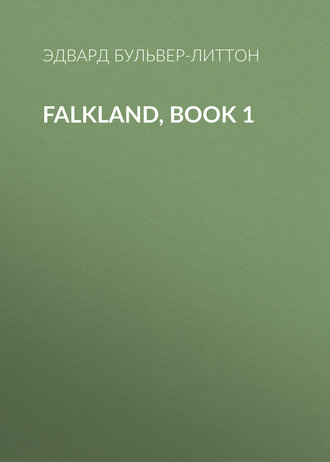 полная версия
полная версияFalkland, Book 1
FROM ERASMUS FALKLAND, ESQ., TO THE HON. FREDERICK MONKTON
I have had two or three admonitory letters from my uncle. "The summer (he says) is advancing, yet you remain stationary in your indolence. There is still a great part of Europe which you have not seen; and since you will neither enter society for a wife, nor the House of Commons for fame, spend your life, at least while it is yet free and unshackled, in those active pursuits which will render idleness hereafter more sweet; or in that observation and enjoyment among others, which will increase your resources in yourself." All this sounds well; but I have already acquired more knowledge than will be of use either to others or myself, and I am not willing to lose tranquillity here for the chance of obtaining pleasure elsewhere. Pleasure is indeed a holiday sensation which does not occur in ordinary life. We lose the peace of years when we hunt after the rapture of moments.
I do not know if you ever felt that existence was ebbing away without being put to its full value: as for me, I am never conscious of life without being also conscious that it is not enjoyed to the utmost. This is a bitter feeling, and its worst bitterness is our ignorance how to remove it. My indolence I neither seek nor wish to defend, yet it is rather from necessity than choice: it seems to me that there is nothing in the world to arouse me. I only ask for action, but I can find no motive sufficient to excite it: let me then, in my indolence, not, like the world, be idle, yet dependent on others; but at least dignify the failing by some appearance of that freedom which retirement only can bestow.
My seclusion is no longer solitude; yet I do not value it the less. I spend a great portion of my time at E–. Loneliness is attractive to men of reflection, nor so much because they like their own thoughts, as because they dis like the thoughts of others. Solitude ceases to charm the moment we can find a single being whose ideas are more agreeable to us than our own. I have not, I think, yet described to you the person of Lady Emily. She is tall, and slightly, yet beautifully, formed. The ill health which obliged her to leave London for E–, in the height of the season, has given her cheek a more delicate hue than I should think it naturally wore. Her eyes are light, but their lashes are long and dark; her hair is black and luxuriant, and worn in a fashion peculiar to herself; but her manners, Monkton! how can I convey to you their fascination! so simple, and therefore so faultless—so modest, and yet so tender—she seems, in acquiring the intelligence of the woman, to have only perfected the purity of the child; and now, after all that I have said, I am only more deeply sensible of the truth of Bacon's observation, that "the best part of beauty is that which no picture can express." I am loth to finish this description, because it seems to me scarcely begun; I am unwilling to continue it, because every word seems to show me more clearly those recesses of my heart, which I would have hidden even from myself. I do not yet love, it is true, for the time is past when I was lightly moved to passion; but I will not incur that danger, the probability of which I am seer enough to foresee. Never shall that pure and innocent heart be sullied by one who would die to shield it from the lightest misfortune. I find in myself a powerful seconder to my uncle's wishes. I shall be in London next week; till then, fare well. E. F.
When the proverb said, that "Jove laughs at lovers' vows," it meant not (as in the ordinary construction) a sarcasm on their insincerity, but inconsistency. We deceive others far less than we deceive ourselves. What to Falkland were resolutions which a word, a glance, could over throw? In the world he might have dissipated his thoughts in loneliness he concentred them; for the passions are like the sounds of Nature, only heard in her solitude! He lulled his soul to the reproaches of his conscience; he surrendered himself to the intoxication of so golden a dream; and amidst those beautiful scenes there arose, as an offering to the summer heaven, the incense of two hearts which had, through those very fires so guilty in themselves, purified and ennobled every other emotion they had conceived,
God made the country, and man made the town.
says the hackneyed quotation; and the feeling awakened in each, differ with the genius of the place. Who can compare the frittered and divided affections formed in cities with that which crowds cannot distract by opposing temptations, or dissipation infect with its frivolities?
I have often thought that had the execution of Atala equalled its design, no human work could have surpassed it in its grandeur. What picture is more simple, though more sublime, than the vast solitude of an unpeopled wilderness, the woods, the mountains, the face of Nature, cast in the fresh yet giant mould of a new and unpolluted world; and, amidst those most silent and mighty temples of THE GREAT GOD, the lone spirit of Love reigning and brightening over all?
1
Quid aegrotus unquam somniavit quod philosophorum aliquis non dixerit?—LACTANTIUS.









